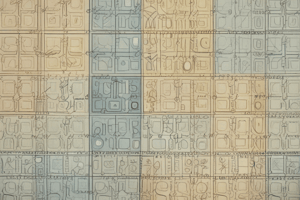Podcast
Questions and Answers
Which principle proposed by Mendel describes the inheritance of traits by stating that during meiosis, each parent contributes only one allele for each gene to the gametes?
Which principle proposed by Mendel describes the inheritance of traits by stating that during meiosis, each parent contributes only one allele for each gene to the gametes?
- Law of Incomplete Dominance
- Law of Segregation (correct)
- Law of Dominance
- Law of Independent Assortment
What did Mendel's Law of Dominance state in regards to gene expression?
What did Mendel's Law of Dominance state in regards to gene expression?
- One allele can mask the expression of the other allele (correct)
- Only recessive alleles are expressed
- Both alleles are expressed equally in heterozygotes
- Different alleles blend together in hybrids
In a genetic cross using a Punnett square, what does each square of the grid represent?
In a genetic cross using a Punnett square, what does each square of the grid represent?
- One chromosome
- One trait
- One allele (correct)
- One gene
An organism with two different alleles for a gene is known as:
An organism with two different alleles for a gene is known as:
Which genetic concept involves one allele being unable to completely mask the expression of another, resulting in a blending of traits?
Which genetic concept involves one allele being unable to completely mask the expression of another, resulting in a blending of traits?
What is a Punnett square used to predict?
What is a Punnett square used to predict?
Which law of Mendelian genetics states that genes for different traits are distributed independently of each other during meiosis?
Which law of Mendelian genetics states that genes for different traits are distributed independently of each other during meiosis?
In incomplete dominance, how does the phenotype of a heterozygote compare to the phenotypes of the two homozygous parents?
In incomplete dominance, how does the phenotype of a heterozygote compare to the phenotypes of the two homozygous parents?
What is a pedigree used for in genetic studies?
What is a pedigree used for in genetic studies?
What is the difference between a genotype and a phenotype?
What is the difference between a genotype and a phenotype?
Study Notes
Mendelian Genetics
Mendelian genetics is a branch of genetics that studies the inheritance of traits from parents to offspring. It was named after Gregor Mendel, an Austrian monk who conducted experiments on pea plants in the mid-19th century. Mendel's work laid the foundation for our understanding of inheritance patterns and how traits are passed down from one generation to the next.
Punnett Squares
A Punnett square is a tool used in genetics to predict the genotypes and phenotypes of offspring from genetic crosses. It is named after R. C. Punnett, who introduced the concept in 1905. The square is a grid of possible combinations of alleles from two parents, allowing researchers to determine the expected proportions of genotypes and phenotypes in their offspring.
Mendel's Laws
Mendel proposed three fundamental principles to describe the inheritance of traits in organisms:
-
The Law of Segregation: This principle states that during meiosis, each parent contributes only one allele for each gene to the gametes, and these alleles separate randomly. When gametes fuse during fertilization, the resulting offspring will inherit one allele from each parent.
-
The Law of Dominance: This principle states that one allele of a gene can completely mask the expression of the other allele. An organism with two different alleles for a gene is called a heterozygote. In a heterozygote, only the dominant allele will be expressed, while the recessive allele remains "hidden" and does not affect the organism's appearance.
-
The Law of Independent Assortment: This principle states that genes for different traits are distributed independently of each other during meiosis. This means that the inheritance of one trait does not affect the inheritance of another trait.
Incomplete Dominance
While Mendel's original laws described the inheritance of traits as dominant or recessive, it is now known that some alleles do not behave in this simple way. Incomplete dominance is a situation where the phenotype of a heterozygote (individual with one dominant allele and one recessive allele) is an intermediate form between the phenotypes of the two homozygous parents. This means that the recessive allele does not completely mask the expression of the dominant allele, and both alleles contribute to the organism's appearance.
Pedigree Analysis
A pedigree is a diagram that shows the genetic relationship between individuals in a family. Pedigree analysis is used to study the inheritance of traits in families and to identify patterns of inheritance. This helps researchers understand the genetic basis of a trait and can be useful in predicting the risks of certain genetic disorders.
Genotype vs. Phenotype
The genotype of an organism refers to its complete set of genetic information, including both alleles for each gene. The phenotype, on the other hand, is the observable characteristics of an organism, such as its appearance or behavior. While the genotype determines the phenotype, the relationship between the two is not always straightforward, as some alleles may have incomplete dominance or codominance effects.
In summary, Mendelian genetics provides a framework for understanding the inheritance of traits in organisms. It introduces the concept of alleles, dominance, and the laws of segregation, dominance, and independent assortment. While these principles have been modified and expanded upon in modern genetics, they continue to serve as a foundation for our understanding of genetic inheritance.
Studying That Suits You
Use AI to generate personalized quizzes and flashcards to suit your learning preferences.
Description
Explore the principles of Mendelian genetics including Punnett squares, Mendel's laws, incomplete dominance, pedigree analysis, and the distinction between genotypes and phenotypes. Learn about the fundamental concepts that govern the inheritance of traits from one generation to the next.




